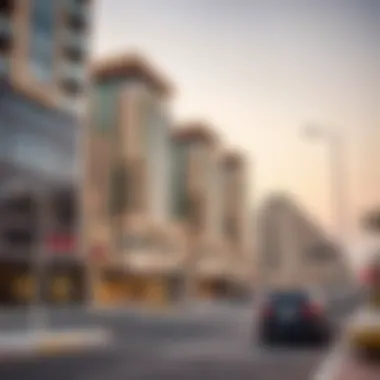Insights into Dubai's Secondary Real Estate Market


Intro
Dubai's real estate landscape is a tapestry woven with ambition, extravagance, and modernity. Within this vibrant city, the secondary market plays a pivotal role in shaping the investment opportunities available to buyers, both local and international. In recent years, this sector has seen a surge in interest, driven by various factors that influence buyer decisions. As the city continues to evolve and attract a diverse pool of residents, understanding the nuances of the secondary market becomes essential for anyone looking to make informed investment choices.
The secondary market, essentially, encompasses properties that have changed hands at least once before. This facet stands in contrast to the primary market, where new developments are sold directly by developers. Here, we explore the intricacies of Dubai’s secondary real estate market, highlighting its significance, current trends, and what buyers need to consider when engaging with it.
Market Trends
The dynamic nature of Dubai's real estate market is influenced by both local and global economic conditions. When delving into the secondary market, one must take note of the current trends and future predictions that outline the investment climate.
Current Market Analysis
As of late 2023, the secondary market has demonstrated remarkable resilience. Recent statistics indicate an uptick in transaction volumes, with several neighborhoods witnessing a blooming interest from buyers. For instance, areas like Jumeirah Village Circle and Dubai Marina have seen a noticeable increase in property sales.
This rise can be attributed to several key factors:
- Affordability: Compared to newly built properties, many buyers find attractive pricing in the secondary market, often leading to better deals.
- Location Appeal: Established neighborhoods tend to offer accessibility to schools, shopping, and other amenities, making them attractive for families.
- Rental Yield: Investors looking for income-generating properties are often drawn to secondary homes for their potential higher yields compared to new developments.
Furthermore, with the ongoing recovery in tourism and foreign investments, the market is anticipated to stabilize, benefiting investors seeking long-term gains.
Future Predictions
Looking ahead to 2024 and beyond, experts predict subtle shifts influenced by both technological and economic factors.
- Smart Property Tech: The rise of smart homes is expected to impact buyer preferences significantly. Many investors may lean towards renovated properties that integrate technology for convenience and energy efficiency.
- Sustainability Trends: As global awareness of sustainability grows, demand for eco-friendly properties will likely increase. The secondary market could see a spike in buyers seeking energy-efficient upgrades.
- Regulatory Changes: The government may introduce new policies aimed at enhancing buyer protection, which could bolster investor confidence and attract a diverse range of property seekers.
"Understanding the market landscape is crucial for any investor's success in navigating the complex dynamics of real estate."
Property Investment Insights
Investors venturing into Dubai's secondary market need to consider several factors that can add value to their investments. Gaining a grasp on different types of investment properties and financing options is vital to making sound decisions.
Types of Investment Properties
In the secondary market, properties range from luxurious villas to cozy apartments. Here are some notable categories:
- Residential Units: Ideal for both rental income and personal use, they are the bread and butter of real estate investing.
- Commercial Real Estate: Offices and retail space often yield higher returns compared to residential pieces, yet they come with their own set of challenges.
- Mixed-Use Developments: Combining residential and commercial spaces, these properties are well-suited for maximizing investment potential.
Financing Options and Tips
When it comes to financing, understanding the various options available is key. Investors often rely on a mix of cash purchases, mortgages, and investment loans. Some practical tips include:
- Shop Around for Mortgages: Different lenders may offer varying conditions; ensure you compare rates and offerings.
- Consider Down Payments: A higher initial payment may reduce long-term interest costs and lead to better mortgage terms.
- Engage with Local Banks: Many banks in Dubai have specific lending guidelines for locals and expats, so it’s essential to stay well-informed.
For further insight and up-to-date information, consider visiting Dubai Land Department or engaging in discussions on platforms like Reddit where user experiences provide a valuable perspective.
Understanding the Secondary Market
In today’s vibrant landscape of Dubai real estate, grasping the concept of the secondary market is essential for a potential investor or any interested party. The secondary market represents a realm beyond the new developments directly offered by builders. Here, pre-owned properties change hands, providing both unique opportunities and distinct challenges. Understanding this market serves as a compass for navigating the intricacies of property transactions.
Investing in this sector often offers buyers properties with established histories, neighborhoods, and values. Such a landscape allows for comparisons to new constructions and insights into pricing trends. Furthermore, the secondary market generally has more flexible pricing, giving buyers negotiation power that is often nonexistent with new developments. Essentially, understanding the secondary market is not just about knowing the numbers; it’s about grasping the dynamics that influence buyer sentiment and investment viability.
Defining the Secondary Market
The secondary market, within the context of Dubai real estate, encompasses previously owned properties that are put on the market by sellers. It includes a variety of property types from apartments to villas, catering to a wide spectrum of investors and homeowners.
In simpler terms, this market acts as a conduit through which existing properties find new owners. Unlike the primary market, which comprises brand-new properties directly from developers, the secondary market provides a wider selection that often includes residences with unique characteristics, charm, and in established locations.
This area of real estate can be defined by several key aspects:
- Established Infrastructure: Properties in this market often sit in developed neighborhoods, providing buyers with the benefit of nearby amenities, schools, and transportation.
- Variety of Options: Investors can find diverse property types catering to various budgets and preferences.
- Historical Context: Each property comes with its history, adding layers of information that can influence price and desirability.
The Role of the Secondary Market in Real Estate
The secondary market holds a pivotal role in the broader real estate landscape of Dubai. It acts as a mirror reflecting the performance of the primary market, offering insights into demand versus supply dynamics and economic conditions. When people think of investing in real estate, they often overlook the impact of this secondary sector.
"The secondary market is often seen as a barometer for real estate health, shedding light on trends that can influence future investments and developments."
Here are a few ways this market plays a critical role:
- Price Stabilization: The existence of the secondary market helps stabilize property prices. If new properties are highly priced, buyers will often look to the secondary market for more affordable options, balancing the overall market.
- Fluidity of Ownership: This market promotes fluidity as buyers can quickly enter and exit, supporting an active trading environment. This fluidity can be beneficial for the economy as capital is constantly circulated.
- Market Trends: A keen examination of trends in the secondary market can alert investors to shifts in buyer preferences and emerging neighborhoods, ultimately guiding their investment strategies.
- Attracting Diverse Buyers: The diverse range of properties available makes it attractive not just to local investors but also to expats looking to settle in Dubai. More options can draw in foreign investments, enhancing the market's appeal.


Understanding this market is not simply about transactions. It's about recognizing the patterns, the buyer psychology, and the factors that influence decision-making. For anyone looking into Dubai’s real estate market, having this knowledge under their belt is priceless.
Current Trends in Dubai's Secondary Market
The secondary real estate market in Dubai is a vibrant and fluid ecosystem that reflects the city’s constant evolution and economic dynamism. Understanding the current trends within this market is paramount for anyone looking to invest, whether local or foreign. These trends inform not just the price of properties but also the mindset of buyers, influencing decisions that could lead to significant financial rewards or pitfalls. Observing these patterns can provide critical insights that help you navigate the complex terrain of property investments.
Market Dynamics
Dubai’s secondary market is marked by its ever-shifting dynamics. Factors such as demographic changes, economic policies, and shifting preferences in living arrangements all play a vital role. For instance, newer expatriate communities have spurred demand in certain previously overlooked neighborhoods, driving up property values. This illustrates how the market is closely tied to the city's socioeconomic fabric.
- Increased Demand for Affordable Housing: With rising costs in primary properties, buyers often turn to secondary options that offer a better financial feasibility. Properties in areas like Jumeirah Village Circle or Dubai Sports City have witnessed a surge in interest due to perceived value for money.
- Appeal of Established Neighborhoods: Popular enclaves like Downtown Dubai still hold desirability, but buyers are often looking for the best value in their investments. This has created a competitive space where buyers scour listings to find hidden gems among the high-profile properties.
The dynamics can be as unpredictable as they are fascinating, and keeping an ear to the ground can yield lucrative investments if one understands the whispers of the market.
Impact of Economic Conditions
Economic conditions are the bedrock that holds the secondary market together—any fluctuations can set off ripples that resonate through property prices and buyer behavior. Analyzing trends in Dubai illuminates how macroeconomic elements can shape the market landscape.
- Oil Prices and Global Relations: As a city that heavily relies on tourism and trade, the fluctuation of oil prices has a direct effect on the wealth of potential buyers. A rise in oil prices typically leads to increased investment from expatriates and locals alike, while downturns can tighten spending.
- Government Policies: Recent initiatives aimed at attracting foreign investment, such as long-term visas and improved regulations, have reinvigorated buyer interest. These strategic moves often result in a more stable investment climate, fostering confidence among secondary market participants.
It's essential for potential investors to closely monitor economic indicators and governmental initiatives. Being proactive can be the key to understanding where to place their bets in an ever-evolving market.
Post-Pandemic Recovery
The post-pandemic phase has brought new life into Dubai’s secondary market, revealing previously unconsidered opportunities. The virus reshaped many elements of daily life, consequently influencing property preferences.
- Shift to Larger Spaces: Many buyers now seek homes that provide more room for remote work and leisure. This change has especially impacted suburbs and areas previously deemed too far from urban centers.
- Adaptation of Investment Strategies: Investors have begun to pivot toward properties that are more adaptable to future changes in living preferences. Homes that offer outdoor spaces, smart home features, and proximity to community amenities are gaining traction.
In many ways, the pandemic has acted as a catalyst for transformative change in buyer demand and market offerings, creating an environment ripe for new investment strategies.
"Adapting to change is not just part of the real estate game; it's the name of the game."
Conclusively, understanding the current trends in Dubai's secondary market is not just beneficial, it's essential. For anyone looking to make sense of their investment choices, staying abreast of these evolving conditions can make all the difference in carving out a successful property portfolio.
Investment Opportunities
Investing in the secondary market of Dubai's real estate landscape offers a myriad of possibilities that can be both rewarding and complex. Understanding these opportunities is crucial, especially considering Dubai’s dynamic economy and its status as an international hub for trade and tourism.
Advantages of Investing in the Secondary Market
The secondary market holds various advantages for investors. Here are some key benefits that one might consider:
- Potential for Better Prices: Properties in the secondary market are often available at lower prices than new developments. This price point can be appealing for first-time buyers or investors looking for budget-friendly options.
- Established Infrastructure: Properties in the secondary market tend to be located in neighborhoods with existing infrastructure, making them more attractive. Think about it, when you buy into an established area, you benefit from schools, parks, and roads that are already in place.
- Easier Access to Financing: Some financial institutions find it easier to finance properties in the secondary market compared to those that are newly built. This accessibility can make a significant difference when it comes to securing loans or mortgages.
- Rental Income Potential: Many investors look at the secondary market for rental opportunities. With a growing population of expatriates in Dubai, demand for rental properties remains high, translating into steady income for property owners.
Investors often find that the return on investment in established neighborhoods is more predictable.
Identifying Promising Properties
Finding the right property in a crowded secondary market can feel like searching for a needle in a haystack. However, there are clear strategies that can be employed to uncover promising investments:
- Research Specific Neighborhoods: Familiarize yourself with various neighborhoods. Some areas may be undervalued or are showing signs of future growth. Data from local real estate websites and forums like Reddit can provide insights from other investors.
- Look for Distressed Properties: Properties needing renovations might be available at a bargain. With the right improvements, these properties can significantly increase in value. Get your hands dirty, as a little elbow grease can pay off.
- Analyze Market Trends: Keep tabs on real estate reports and statistics that show price trends and sales frequency. Websites such as Wikipedia and Britannica provide a wealth of knowledge and data that can help with this analysis.
- Consult Local Agents: Real estate agents with experience in the secondary market can offer substantial guidance. They often have a pulse on what properties are about to hit the market and which ones are worth considering.
Incorporating these elements into your approach can help steer you toward lucrative investment opportunities in the bustling real estate scene of Dubai. As you navigate the secondary market, keeping these advantages and strategies in mind will be your guiding compass in this vibrant landscape.
Challenges in the Secondary Market
The secondary market in Dubai's real estate sector is not just a haven for opportunities; it's also a landscape riddled with complexities. Investors eyeing this market need to tread carefully due to various challenges that can significantly impact their returns. In this segment, we will delve into two primary challenges: market volatility and legal and regulatory issues.
Market Volatility
Market volatility in Dubai's secondary real estate landscape has been a frequent topic of conversation. One minute, a property can be the apple of an investor's eye, and the next, it feels as though the rug has been pulled out from under their feet. Prices can fluctuate due to a multitude of factors, such as changes in demand, economic shifts, or even geopolitical tensions. As a result, understanding these variables is crucial for anyone involved in the market.
While volatility can mean opportunity for short-term traders, it also poses risks. Investors must be prepared for the ebb and flow of the market, much like a ship navigating turbulent waters. The key here is to stay informed. Regularly reviewing market trends, speaking with seasoned professionals, and conducting thorough research can equip investors with the tools they need to weather any storm.
- Key Considerations:
- Stay updated on economic indicators influencing property values.
- Analyze historical data to frame predictions regarding property performance.
- Utilize tools and platforms like Zillow to monitor real-time market changes.
"The only thing predictable in the Dubai real estate market is its unpredictability."
Legal and Regulatory Issues
Navigating the legal landscape of the secondary market in Dubai is akin to trying to decipher a maze without a map. For new investors, understanding the nuances of property laws can be daunting. The real estate regulations can often seem convoluted and are subject to change, which can leave buyers in a precarious position if they're not well-informed.


Legal complications can arise from issues such as ownership disputes, encumbrances, or changes in property laws and regulations. Failing to adhere to local laws can lead to costly penalties or even losing one's investment altogether. Investors must ensure that due diligence is carried out before any transaction takes place. It's advisable to engage seasoned legal professionals who specialize in real estate to review contracts and guide the buying process.
- Important Points to Address:
- Understanding Dubai's real estate laws and property rights.
- Regularly consult with legal advisors familiar with local regulations.
- Keep abreast of changes in policies that could affect property ownership.
In summary, while engaging with the secondary market in Dubai presents a plethora of opportunities, investors must remain vigilant regarding volatility and legal issues. The importance of thorough research and professional guidance cannot be overstated, as these steps can often mean the difference between a fruitful investment and a costly misstep.
Neighborhood Analysis
Understanding the neighborhoods within the secondary market in Dubai is fundamental for both new investors and seasoned buyers. The location of a property can significantly influence its value, potential for appreciation, and attractiveness to renters or buyers. Consideration of neighborhood factors can lead to better investment choices and maximization of returns. This section explores the emerging neighborhoods that represent new opportunities, as well as the benefits and challenges of established areas.
Emerging Neighborhoods
The landscape of Dubai is ever-evolving, with new neighborhoods continuously sprouting up, some quietly making their mark while others come in like a lion. Areas such as Dubai South and Dubai Marina are often highlighted as burgeoning spots, offering modern amenities and developments that appeal particularly to young professionals and expats. Investing in these emerging neighborhoods can be akin to catching a wave just before it breaks.
Benefits include:
- Affordability: Typically lower entry prices compared to long-established areas.
- Growth Potential: As infrastructure develops and urban plans unfold, property values often rise.
- Community Building: New neighborhoods often foster a sense of community, attracting diverse populations looking for vibrant environments.
However, one has to exercise caution. Some emerging areas may lack the mature infrastructure or amenities that buyers desire. Extensive research is essential. Consider visiting the neighborhoods at different times of day to assess the livability or vibe. Consider local projects underway, which might be a telltale sign of future growth or decline.
Established Areas vs. Emerging Markets
When weighing options between established neighborhoods and the prospects of emerging markets, investors may find themselves at a crossroads. Established areas such as Downtown Dubai or Dubai Creek offer luxury properties and have proven rental yields. Such locations often come with a certain prestige and can sometimes feel like a safe bet. The historical significance and familiarity can easily sway your decision.
On the flip side, emerging markets might present untapped potential. Think of them as the underdog in a race, capable of surprising investors when they least expect it. Properties in these areas might require more vision, but the rewards could outweigh the risks.
“It’s not always about where you invest, but when.”
Considerations include:
- Investment Horizon: Are you looking for quick returns, or are you in it for the long haul?
- Market Stability: Established areas tend to have a more stable demand, but emerging markets can offer higher yields in terms of growth.
- Lifestyle Preferences: Think about what kind of community you want to be part of. Established neighborhoods often boast convenience, while emerging areas can provide a fresh, modern experience.
In summary, neighborhood analysis is not merely an academic exercise but a pivotal strategy in making smart investment decisions in Dubai's secondary real estate market. From the buzzing energy of emerging areas to the tried-and-true stability of established locations, taking the time to understand these factors will help investors navigate the complex landscape effectively.
Financing and Investment Strategies
In the realm of Dubai's secondary real estate market, understanding financing and investment strategies is crucial for prospective buyers and investors alike. This landscape not only dictates how transactions occur but also shapes the potential for profitability and growth. Comprehending the financial mechanisms available can mean the difference between a sound investment and an unfortunate misstep. Therefore, exploring the nuances of financing options and strategic approaches can elevate investors’ ability to capitalize on opportunities.
Financing Options for Investors
When diving into property investments in Dubai, one of the first tasks is to understand the various financing options available. Here are some of the prevalent ways to secure funds for real estate acquisitions:
- Mortgages: Traditional mortgages remain a popular choice. Banks and financial institutions in Dubai offer competitive mortgage rates for both expats and UAE nationals. It's essential to shop around, as rates, tenure, and terms can differ greatly.
- Personal Loans: For those who might not want to engage with a full mortgage, personal loans serve as an alternative albeit with higher interest rates. They can provide immediate cash without the need for collateral secured against property.
- Equity Release: If you already own property, tapping into its equity can provide the necessary capital for a new investment. This process can simplify funding and often has favorable interest rates compared to unsecured borrowing options.
- Cash Transactions: In a market like Dubai, having cash on hand can provide leverage. Cash buyers often have the upper hand, able to negotiate better deals and secure properties quickly without the lengthy mortgage approval process.
While all these options present unique advantages, considerations like interest rates, fees, and the terms of repayment play significant roles in decision-making. Investors should conduct a thorough examination of these factors to align financing choices with their long-term investment strategies.
Strategic Approaches to Maximizing Returns
Investing without a strategy is like sailing a ship without a compass; one risks navigating into turbulent waters without a clear plan. A well-structured investment strategy in the secondary market is pivotal to achieving high returns. Here are some practices that can help maximize returns:
- Market Research: Continuous and comprehensive analysis of market trends, neighborhood developments, and economic indicators can point investors toward ripe opportunities. Understanding what areas are emerging versus those already established can vastly improve investment decisions.
- Property Valuation: Calculate potential returns by accurately assessing property values. Comparing similar properties in desired neighborhoods can provide insights into fair market pricing and potential appreciation.
- Diversification: Investors should not put all their eggs in one basket. Spreading investments across various property types or geographic areas can lessen risk while maximizing potential gains.
- Use of Technology: Harness tools and platforms that provide data analytics on market performance. Real estate technology services can provide insights, real-time data, and the ability to predict trends more accurately.
- Long-term vs. Short-term: Deciding between short-term flipping versus holding properties for rental income is essential. While flipping may offer quick gains, rental income can provide sustained revenue over time. Each approach has its merits and should align with the investor's financial goals.
Ultimately, effective financing and strategic investment approaches act as the bedrock for long-term success in Dubai's ever-evolving secondary real estate market. Regularly re-evaluating one's strategy in light of changing market conditions ensures that investors remain competitive and informed.
Navigating the Buying Process
Understanding the buying process is crucial for anyone looking to dip their toes into the secondary real estate market in Dubai. This pathway can be filled with twists and turns, and knowing the ins and outs can mean the difference between a solid investment and a costly mistake. Navigating this process not only involves understanding the steps necessary for purchasing property but also assessing which elements can potentially save time and yield better financial returns in the bustling Dubai market.
For investors and buyers alike, grasping the buying process can pave the way for a smoother transaction and enhance the chances of finding a property that fits one's specific needs. Moreover, with the digitalization of property listings, there are new methods and tools that can help buyers make informed decisions.
Steps in the Buying Process
- Define Your Budget: Before entering the market, it's essential to establish a clear budget. This includes not just the cost of the property itself but also additional expenses such as maintenance fees, property taxes, and any potential renovations.
- Research the Market: Familiarizing yourself with current market trends can provide a clearer picture of where to invest. Websites like Property Finder can offer valuable insights into property prices and neighborhood trends in Dubai.
- Select a Neighborhood: Determining which neighborhoods align with your lifestyle and investment goals is key. Emerging areas might offer more affordable options, while established neighborhoods could result in greater long-term value.
- Hire a Real Estate Agent: A qualified real estate agent can guide you through the process. It's vital to choose someone who has deep knowledge of the Dubai market and the secondary sector specifically.
- View Properties: Once you have shortlisted properties, arrange viewing appointments. This allows you to assess the condition and appeal of potential homes.
- Make an Offer: If you find a property you love, it’s time to make an offer. Your agent can help you decide on a fair price based on market analysis.
- Due Diligence: After your offer is accepted, conduct thorough due diligence. This involves checking the legal status of the property and ensuring there are no outstanding issues.
- Finalize the Deal: Once everything checks out, you’ll finalize the deal. This typically involves signing contracts and transferring ownership.
- Post-Purchase Management: After the acquisition, consider how you will manage the property. This can include hiring a management company or owning the property outright.
Role of Real Estate Agents in the Secondary Market
Engaging a real estate agent in Dubai's secondary market can be a game-changer for buyers, especially for those unfamiliar with the maze of property transactions. Agents can provide significant advantages, such as:
- Market Expertise: Navigating through various listings and understanding the nuances of each neighborhood can be overwhelming. Agents have firsthand knowledge of market fluctuations and can provide tailored advice.
- Negotiation Skills: An agent can advocate on your behalf to secure the best possible price. Their experience with property negotiations can be invaluable.
- Access to Listings: Real estate agents often have exclusive access to listings that are not publicly advertised. This can open up opportunities that prospective buyers may not find on their own.


In summary, teaming up with a qualified real estate agent can smooth out many bumps in the buying process, making the journey towards acquiring property in Dubai's secondary market considerably less daunting.
"Navigating the secondary market effectively requires both knowledge and the right partnerships. An experienced real estate agent can provide insights that can transform your buying experience."
For more detailed information on the Dubai real estate landscape, you may find resources at Dubai Land Department which offers comprehensive guidelines and data.
Impact of Technology on the Market
Technology has become a game changer in the secondary real estate market in Dubai. It offers a myriad of tools and platforms that enhance the efficiency of buying, selling, and managing properties. With a digital-savvy population, understanding the impact of these technologies is key for investors, buyers, and agents alike.
One of the more significant elements is the emergence of real estate platforms. These platforms provide a streamlined process for listing properties, which attracts potential buyers much more effectively than traditional methods. Buyers can access listings from the comfort of their homes, making the market significantly more approachable. This shift to online platforms has also made it possible for buyers to compare properties, monitor price trends, and receive updates on new listings in real-time.
Another crucial aspect of technology's influence is in the way transactions are processed. With e-signature technology and blockchain solutions, many cumbersome steps traditionally involved in property transactions have been simplified. This not only shortens the time it takes to finalize a deal but also adds an extra layer of security and transparency, which is especially important in a market that can sometimes be opaque.
"The digital transformation in real estate is not just a trend; it's a new standard that shapes how transactions are conducted."
Moreover, analytics play a critical role in understanding market dynamics. Data-driven insights can help investors make informed decisions. Tools that analyze market trends, buyer behavior, and historical data can provide an edge when identifying promising investments. This level of intelligence wasn't as readily available before, and those who leverage it can potentially gain significant advantages in the competitive landscape.
Finally, the impact of technology isn't limited to platforms and transactions. Digital marketing strategies have become essential in attracting buyers. Sellers need to embrace social media, email marketing, and SEO tactics to increase the visibility of their listings. Utilizing these channels effectively can lead to a quicker sale at a better price.
In summary, technology isn't merely an adjunct to the secondary market; it forms the backbone of its current landscape. By understanding and utilizing these technological advancements, investors and buyers can navigate the Dubai secondary market more successfully.
Case Studies
Case studies hold a significant place within the context of Dubai's secondary real estate market. They offer a window into real-world scenarios that reflect the complexities and opportunities inherent in property transactions. Through detailed examination of past investors’ journeys, both successful and unsuccessful, one can glean insights about market trends, buyer behavior, and the factors that can lead to fruitful investments or dismal failures.
Understanding these case studies empowers potential investors and agents alike to make informed decisions. They serve as valuable lessons in how to approach the market, what pitfalls to avoid, and which strategies might yield the best returns.
Successful Investments in the Secondary Market
One striking example of successful investment in the secondary market takes us to the Palm Jumeirah, a manmade island that has become synonymous with luxury in Dubai. A group of expat investors purchased several apartments in this iconic area during a downturn in the property market. Their foresight and timing paid off handsomely as property values soared when the market rebounded.
- Key Takeaways from This Case:
- Research and Timing: The investors conducted exhaustive market research, identifying a natural recovery trajectory post-recession.
- Long-Term Vision: They were not swayed by short-term market volatility, showing great patience which has since paid dividends.
- Diversification: By purchasing multiple units, they mitigated risk and secured their positions effectively.
In another instance, an investor keen on the Business Bay area capitalized on a strategic undervalued property. The buyer recognized the potential of the developing infrastructure and emerging businesses, acquiring the property at a low rate. A few years later, when the area reached maturity, the property’s value skyrocketed, resulting in an impressive return.
- Essential Factors at Play:
- Area Development: Understanding the local dynamics and future prospects can often unveil hidden opportunities.
- Investment Flexibility: The ability to adapt and change strategies can make a significant difference in profit margins.
Lessons Learned from Market Failures
Not every investment in Dubai’s secondary market has a happy ending, and there are several case studies illuminating this reality. One example is an ill-fated venture in the Downtown Dubai area. An investor purchased multiple units in a new high-rise that was heavily marketed but suffered from over-promising and under-delivering.
The failure stemmed largely from:
- Lack of Due Diligence: The investor overlooked the importance of analyzing the developer’s track record, which ultimately led to the property not retaining its value.
- Misjudged Market Sentiment: A failure to gauge shifting buyer preferences resulted in prolonged vacancies and subsequent losses.
Another cautionary tale revolves around speculative buying. An individual invested heavily in properties right before the market dip in 2020, driven by aggressive marketing and FOMO (fear of missing out). Unfortunately, when the economic conditions worsened, the investor was left holding properties with plummeting values.
- Lessons from This Scenario:
- Avoid Speculation: Investors should prioritize factual market analysis over speculative trends.
- Objective Financial Planning: Keeping a keen eye on finances and avoiding over-leveraging can safeguard against monumental losses.
By delving into both successful investments and market failures, it's clear that understanding the nuances of the secondary market in Dubai is paramount. Each case study enriches the discourse, guiding investors toward smarter decisions while also cautioning them of potential missteps. These real-life examples will remain instrumental as the Dubai real estate scene continues to evolve.
Future Outlook of the Secondary Market
Understanding the future outlook of the secondary market in Dubai real estate is crucial for anyone interested in navigating this dynamic landscape. As a bustling hub of investment and innovation, Dubai’s real estate sector is continually evolving. Knowledge of future trends and potential challenges can help investors make informed decisions, securing their positions in a highly competitive market. A forward-looking perspective becomes indispensable, as it allows stakeholders to strategically plan their engagements in the real estate arena.
Predictions for Market Growth
The potential for growth in Dubai's secondary market is not merely a pipe dream, but rather backed by several key indicators. Experts predict a steady increase in property transactions, contributing to value appreciation in various neighborhoods. Factors stimulating this growth could include:
- Population Growth: As more expats and professionals flock to Dubai, demand for residential properties will rise. This influx can create competition across the market.
- Government Initiatives: Recent incentives offered by the Dubai government encourage foreign investment, enhancing market liquidity. Such measures include long-term visa options for property investors, which could boost buyer confidence.
- Tourism Resilience: The tourism sector in Dubai tends to rebound robustly after downturns, leading to increased demand for short-term rental properties. With events like Expo 2020 having drawn international interest, the secondary market could see a ripple effect from heightened tourism activities.
Predictions suggest that neighborhoods previously overlooked may become hotspots, influencing property investment strategies. Investors should keep a keen eye on emerging areas, as the shift in demand can turn an attractive profit.
Potential Market Constraints
While the outlook appears promising, various constraints could impede growth in the secondary market. Understanding these challenges can prevent investors from taking missteps. Some considerations include:
- Regulatory Changes: Dubai's regulatory landscape can change rapidly. New laws regarding ownership and leasing may limit who can buy property or the type of investments that can be made. Staying informed about these developments is essential.
- Market Saturation: There is a risk of oversupply in specific segments, particularly luxury properties. If demand does not keep pace with the influx of new developments, property prices could stagnate or even decline.
- Economic Factors: Global economic shifts, such as fluctuating oil prices or geopolitical tensions, could affect investor sentiments. The reliance on oil, while diversifying, still plays a significant role in Dubai's economy. Any downturn here might lead to reduced buyer confidence.
"In the world of real estate, a common saying goes, 'What goes up must come down.' Therefore, keeping an eye on market fluctuations is crucial for savvy investors."
By weighing the potential for growth against the constraints, stakeholders can cultivate strategies that mitigate risks while capitalizing on opportunities. Attention to both the promising and challenging aspects of the secondary market ensures a well-rounded approach to investment in Dubai.











